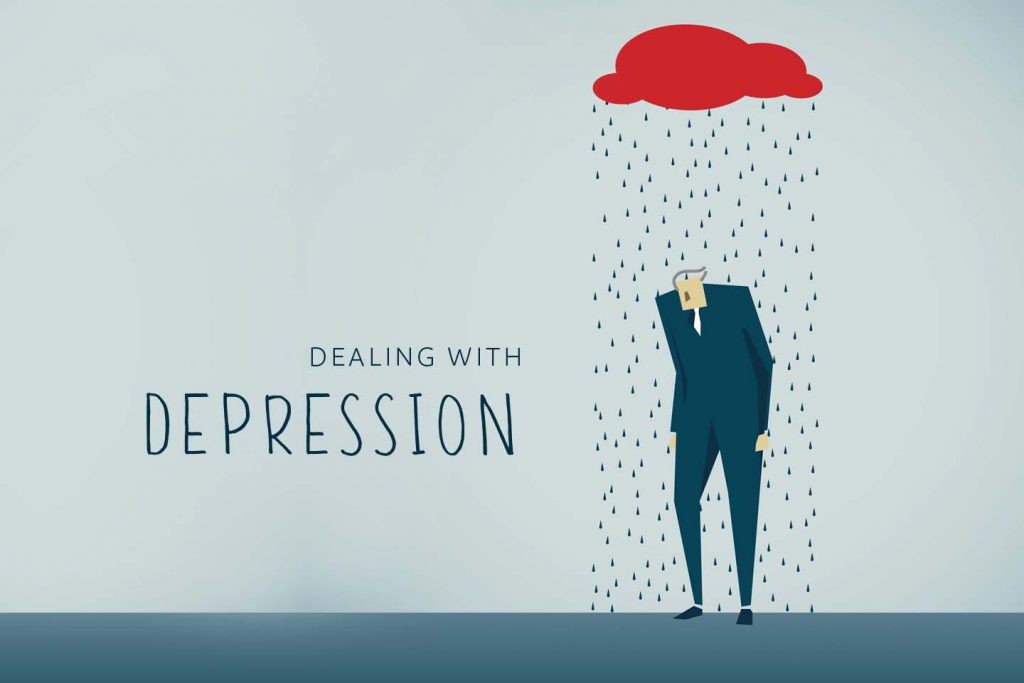Depression poses an unanticipated hazard to modern living and can have a number of complicated and negative effects. Patients should instantly consult the 8 straightforward guidelines about how to deal with depression below in order to reverse this sickness.
Contents
8 simple tips to help you learn how to deal with depression
According to statistics, up to 80% of people will suffer from depression at some point in their lives. Depression is a mood condition characterized by persistently depressed feelings and a lack of drive.
It can have a significant impact on how one thinks, feels, behaves, and other physical and mental issues, lowering one’s quality of life, upsetting their social interactions, and even increasing their risk of suicide.
This condition is often caused by many different causes such as:
- Genetic factors
- Neurotransmitter imbalance
- Lack of sleep, constant insomnia
- Abuse of alcohol and stimulants
- Stressful state, constant pressure
- Psychological trauma, some emotional shock
People with depression must be persistent in carrying out exercises and activities in line with the treatment plan prescribed by a qualified medical professional or psychologist for a sufficient amount of time. Apply these 8 methods on how to deal with depression now:
1. Talk to a Psychologist
A scientific way of life can considerably help with depressed symptom relief, emotional stability, and mood control. Patients can establish for themselves healthy lifestyles such as:
- Sleep for eight hours every night and arrive on time (before 11pm daily)
- Regularly engage in physical activity.
- Prioritize foods high in omega-3 fatty acids, antioxidants, B vitamins, and chromium found in fruits, cereals, meat, and fish when choosing nutritious food sources that are good for the brain and general health.
- Limit your smoking, drink alcohol, and under no circumstances utilize stimulants.
To drive yourself to live a more positive life and fend off the damaging factors that contribute to the condition, as well as to recognize the symptoms of depression on your own, is challenging. You can only learn how to deal with depression while it is in its mild, minimally disruptive early phases if you want to be able to recognize the signs and treat yourself.
People with depression in stages two to three are more severely affected by the illness, frequently depressed, and have lost faith in themselves. Therefore, family and friends should locate reputable psychological centers so that psychologists can support depressed people in the most efficient way. This will help eliminate negative emotions and thoughts, change the perspective of depressed people, and help them find a happy and joyful life again.
2. Always think clearly
When we are depressed and insecure, we are more likely to think poorly of ourselves and our lives, such as that we are pathetic, foolish, or that our lives are too chaotic and unhappy. You must then quietly reassure yourself and lift your spirits by telling yourself over and over again:
- Is current thinking really accurate?
- Is this always true in all cases?
- Are there any exceptions?
- Where am I lacking? What should be improved?
3. Limit anxiety and manage stress
Stress and anxiety frequently co-occur with depression. Therefore, deliberately removing these two things will simplify and improve your life. You ought to:
- Utilize your time wisely, share with coworkers if your workload is too heavy, or ask your loved ones for help if you need it.
- Visit a therapist or psychologist when you’re feeling overly anxious and under pressure for attentive listening and advice on how to control your emotions and stabilize your mood.
- When depressed or sad, avoid making significant decisions.
- Activate your passions (write a diary, write down 5 things you are grateful for in life every day, go for a walk, meditate, do yoga, read a book, cook, embroider, sew, take a relaxing dip. , body massage…)
4. Nurturing relationships and maintaining personal interests
Patients should make an effort to get in touch with their loved ones. You don’t have to dominate every date or stay out late partying. Simply invite your loved ones to a meal, a shopping trip, and conversation. You’ll feel happier and more excited after engaging in these activities.
5. Appreciate and enjoy the present
This advice will enable you to combat depression quite successfully. Since the majority of anxiety, worry, and tension come from the past or the future, focusing as much as you can on the current now will help you to avoid experiencing a lot of these emotions.
Always keep in mind that being alive is a privilege. Being physically healthy is already a privilege. Being around family and friends has been a blessing. It has been a blessing to have a sturdy roof over my head and a reliable work.
6. Set new goals
When daily stress and anxiety become intolerable to you, create bigger, more ambitious goals for yourself and work toward achieving them.
For instance, you make an effort to live a cheerful, upbeat life for your parents, husband, and kids, actively engage in numerous worthwhile volunteer activities, study diligently each day, and put in greater effort to advance at work.
Your ability to continue on your path to a healthy and satisfying life will increase when you connect your future with particular goals.
7. Learn to accept the uncertainty of life
Our sorrows frequently result from a strong desire for confidence and certainty as well as a wish to exert control over everything within our power.
For instance, many patients are frequently anxious and concerned because they want their condition to get well as soon as possible, the sooner the better. However, the course of treatment is frequently drawn out and difficult. They feel even more hurried and worn out as a result of this “unsatisfactory.”
You will find life to be simpler, lighter, and more laid-back if you can just learn to accept letting go of expectations and letting nature take its course for things that are beyond your control.
8. Tell yourself that present pain will become a thing of the past
The best way for those suffering from depression to remind themselves that pain doesn’t stay forever is to calmly face and then gently let go of bad emotions.
All wounds and losses can be healed with time. Regularly reaffirm yourself by whispering the kindest, most uplifting things.
You can compare the present challenges, pressures, and suffering to the excruciating birth pains, which appear insurmountable.
You will eventually feel calmer and more at peace in the presence of stress, pressure, and anxiety, though, if you only take a few minutes to breathe deeply and let your heart rate to go down little in the midst of a busy existence.
Conclusion
Eight straightforward suggestions about how to deal with depression are provided in the article above. In general, the process of treating depression is difficult and takes a certain amount of time. You must adhere to the recommended course of therapy in full, as well as the psychologist’s guidance, develop healthy routines, and keep a hopeful outlook.
Please read: https://walkjp.com/postpartum-depression-treatment-to-avoid-unfortunate-consequences.html





